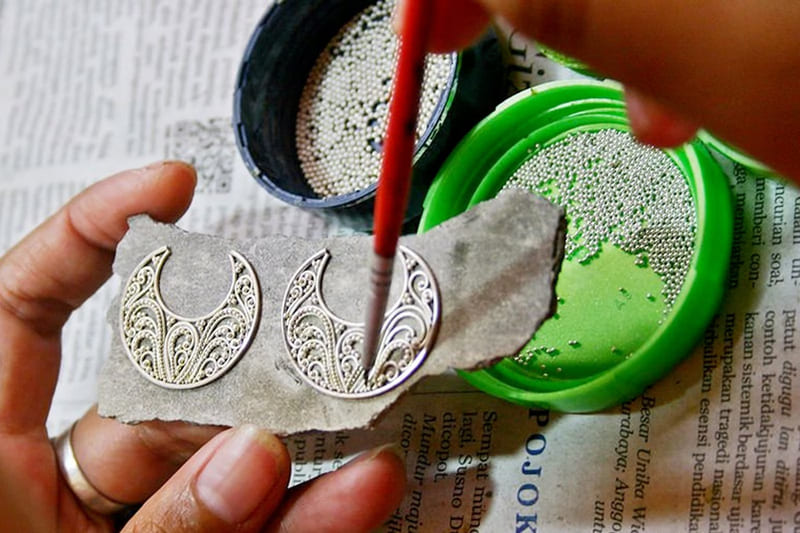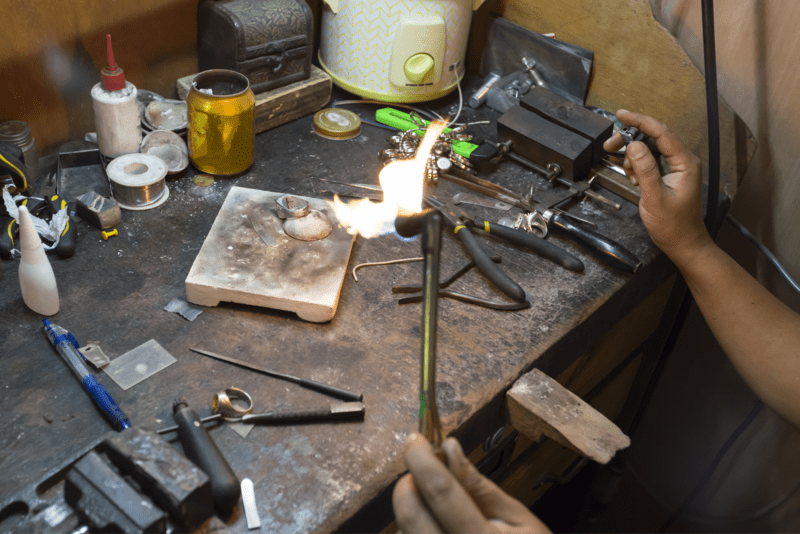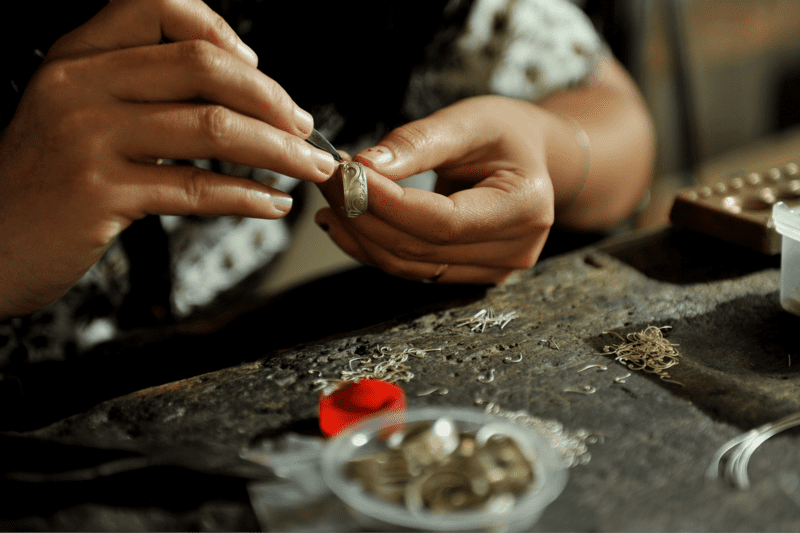The silversmithing workshops in Bali are not just places of craftsmanship; they are living museums where tradition and artistry converge.
Nestled amidst the lush landscapes and vibrant cultural tapestry of Indonesia, Bali stands out as a haven for artisans who breathe life into their creations through traditional crafts. One such art form that has thrived on this tropical island is silversmithing. Renowned for its intricate designs and meticulous craftsmanship, Balinese silversmithing has carved a niche for itself, attracting admirers from around the world.
Historical Roots
The history of silversmithing in Bali dates back centuries, with the craft being passed down through generations. Balinese silversmiths draw inspiration from their rich cultural heritage, incorporating elements of Hindu mythology, nature and everyday life into their designs. The intricate patterns and symbolic motifs tell stories, preserving the island’s cultural narrative in each, finely crafted piece.
Materials and Techniques
The primary material used in Balinese silversmithing is, unsurprisingly, silver. The artisans typically work with sterling silver which contains 92.5% pure silver and 7.5% alloy, ensuring durability and strength. The process begins with melting down the silver, transforming it into a malleable form for crafting.
Traditional techniques play a crucial role in Balinese silversmithing. Among these, the filigree and granulation methods stand out. Filigree involves meticulously twisting and weaving thin silver wires into intricate patterns, creating delicate and lacy designs. Granulation, on the other hand, involves attaching tiny silver balls to a base, forming mesmerising patterns that add depth and texture to the final piece.
The Craftsmen
The artisans behind the mesmerising silver creations of Bali are often part of family-based workshops. Skills are passed down from one generation to the next, fostering a deep connection to the craft. Young apprentices learn the art of silversmithing by observing and assisting seasoned craftsmen, ensuring the preservation of traditional techniques and designs.
Symbolism and Cultural Significance
Balinese silversmithing is not just about creating visually appealing jewellery; it is a form of storytelling. The intricate motifs and symbols often hold cultural significance, representing aspects of Hindu mythology, spirituality and the natural world. Many pieces feature depictions of gods and goddesses, animals and sacred symbols, providing wearers with a tangible connection to Bali’s rich cultural tapestry.
The Workshop Setting
Picture yourself stepping into a traditional Balinese silversmithing workshop, where the air is filled with the rhythmic sounds of hammers meeting silver and the faint scent of heated metal. These workshops, often family-run affairs, are sanctuaries of craftsmanship, where generations of artisans have honed their skills and passed down the art of silversmithing.
Watch as skilled artisans, often part of the same family, sit hunched over their workbenches, expertly manipulating silver into intricate patterns. The enchanting dance of hands reveals a deep understanding of traditional techniques like filigree and granulation. Filigree involves delicately weaving thin silver wires into complex patterns, while granulation requires attaching tiny silver beads to create textures and depth.
Where to Do Silversmithing in Bali
Most of the silversmithing workshops in Bali are located in Sideman and Ubud areas in which you will also get the chance to explore riveting nature, temples and cultural attractions. Ubud, in particular, has earned its reputation as Bali’s cultural hub; a place where tradition is cherished and artistic expression flourishes. The town is home to numerous temples, each a testament to the island’s deep-rooted Hindu heritage. Pura Taman Saraswati, with its lotus pond, and the sacred Monkey Forest Sanctuary are among the many sites that reflect the spiritual essence of Ubud.
Below are some of the Sideman-based and Ubud-based silversmithing workshops you could visit:
Sidemen Silver
In the eastern part of Bali, away from the bustling tourist hubs, lies a hidden gem that whispers tales of tranquillity and showcases the island’s timeless beauty – Sidemen. This idyllic village, surrounded by terraced rice fields and overlooked by towering Mount Agung, offers a retreat into the heart of Balinese culture, where traditional life unfolds against a backdrop of stunning landscapes.
Sidemen Silver, a silver shop in Sidemen, is owned by a family of silver craftsman who also offers 2 hours of silversmithing workshops. In the silver class, participants will undergo several stages. The initial stage involves melting and shaping silver into wires or plates that will serve as the foundation for the silver jewellery. Following this, participants proceed to design their jewellery. Throughout this process, the staff at Sidemen Silver will accompany participants at each stage, providing support and making it convenient for participants to interact or pose questions related to the silver crafting process. For more information, check out their Instagram page @sidemensilver_bali
Prapen Jewellery
Standing as a significant jewellery production centre and showroom in the village of Celuk (south of Ubud), Prapen Jewellery is owned by a Balinese family with a rich heritage in silversmithing. In ancient times, they specialised in crafting ceremonial and household items. Nestled behind the showroom is a diligent workshop where artisans meticulously solder numerous small silver granules onto metal bases. This intricate process demands a high degree of patience, caution and meticulous attention to detail, and it is extensively utilised in the creation of Prapen’s distinctive jewellery pieces.
For those intrigued by craftsmanship, Prapen Jewellery offers the opportunity to reserve a seat and partake in hands-on learning to create your own pieces in the same style. The establishment provides private classes, allowing enthusiasts to delve into rare techniques or explore topics of personal interest, including the heritage granulation techniques unique to Prapen. For more information, check out their Instagram page @prapen_jewellery
Studio Perak
Established by Ketut Darmawan, a skilled Balinese silver artisan and entrepreneur, Studio Perak specialises in crafting exquisite silver jewellery adorned with semiprecious stones, drawing inspiration from organic forms. After successfully creating and exporting his distinctive jewellery pieces, Ketut decided to impart his craft by launching classes in the central area of Ubud.
Conducted in an air-conditioned studio on Jalan Hanoman, Studio Perak offers friendly and informative sessions. A half-day experiential course is available, during which instructors guide participants through the fundamental skills of silversmithing. In just three hours, attendees have the opportunity to create their own uniquely designed silver ring or pendant. For more information, check out their Instagram page @studioperak.
Is it worth a try?
The silversmithing workshops in Bali are not just places of craftsmanship; they are living museums where tradition and artistry converge. Visitors to these workshops are treated to a sensory feast, witnessing the alchemy of silver as the latter turns into stories that adorn the body. As long as the hammers continue to echo in these workshops, the art of silversmithing will remain a timeless expression of Bali’s creativity and cultural richness. While you are in Bali, you should definitely give this unique experience a try.




